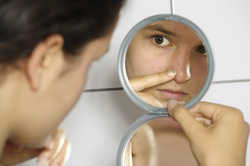More than two thirds of adolescents aged 15 to 20 years suffer from acne, but also some adults and even children. To fight against acne, there are naturalistic acne treatment related to food supplements and natural herbs.
Plants for naturalistic acne treatment
There are plants that, by virtue of their regulatory properties on hormonal secretions, can be used to solve acne problems. These anti-acne plants are the thyme, plantain, fumitory and marigold.
Unknown to most people, there are two other plants that are particularly effective in treating acne thanks to their healing action and anti-septic properties. This is the burdock and wild pansy. You can take caplets (available in the drugstores or supermarket), or concoctions that you can apply as a compress.
The Prairie Dandelion is a rare wild grass found in northern part of Illinois. It is in the family of the Asteraceae, the same family as sunflowers. This herb has detoxifying properties, which makes it effective as a naturalistic acne treatment.
This plant can be found in your garden and contains many beneficial substances: choline, inulin, minerals such as calcium, sodium, silica, sulfur, and a high concentration of potassium in the roots and fresh leaves. Dandelion is used in skin care and cosmetics, it helps treat acne, eczema and other skin rashes.
Primarily used to heal burns, aloe vera has been an effective naturalistic acne treatment. Aloe vera is effective in removing acne scars and blemishes.
Food is a factor in development of acne
Nutrition plays a role in the formation of acne. Thus, to reduce acne, it is advisable to avoid eating too much fat, too much sweets and limiting your intake of meats and chocolate. In terms of recommendations, radishes, carrots, cabbage, apricots or tomatoes are deemed to be good naturalistic acne treatment.
The heat and spiciness in cayenne is principally due to a component called capsaicin, that when used topically to the skin will reduce soreness and irritation by operating on sensory nerve fibres. This property could minimize itchiness and infection linked to acne.
You can take brewers yeast tablets after each meal. Brewer's yeast contains chromium, which is an essential mineral in sugar processing. You can also take 2 teaspoons of brewers yeast per day.
People suffering from acne are often deficient in essential fatty acids. Omega-6 fatty acids are found in evening primrose oil (take 500 mg three times a day), black currant seed oil and borage oil. A tablespoon of fish oil daily also may be effective. The cold-pressed oil from flax seeds is a good source of Omega 3.
Vitamin A will reduce sebum production and is essential to keep the skin healthy. Take 10-15000 IU (no beta-carotene) and 400 IU of vitamin D daily. For severe cases of acne, you can increase the dose to 25,000 IU. In all cases it is better to be under medical supervision because vitamin A can cause side effects at too high a dose.
Plants for naturalistic acne treatment
There are plants that, by virtue of their regulatory properties on hormonal secretions, can be used to solve acne problems. These anti-acne plants are the thyme, plantain, fumitory and marigold.
Unknown to most people, there are two other plants that are particularly effective in treating acne thanks to their healing action and anti-septic properties. This is the burdock and wild pansy. You can take caplets (available in the drugstores or supermarket), or concoctions that you can apply as a compress.
The Prairie Dandelion is a rare wild grass found in northern part of Illinois. It is in the family of the Asteraceae, the same family as sunflowers. This herb has detoxifying properties, which makes it effective as a naturalistic acne treatment.
This plant can be found in your garden and contains many beneficial substances: choline, inulin, minerals such as calcium, sodium, silica, sulfur, and a high concentration of potassium in the roots and fresh leaves. Dandelion is used in skin care and cosmetics, it helps treat acne, eczema and other skin rashes.
Primarily used to heal burns, aloe vera has been an effective naturalistic acne treatment. Aloe vera is effective in removing acne scars and blemishes.
Food is a factor in development of acne
Nutrition plays a role in the formation of acne. Thus, to reduce acne, it is advisable to avoid eating too much fat, too much sweets and limiting your intake of meats and chocolate. In terms of recommendations, radishes, carrots, cabbage, apricots or tomatoes are deemed to be good naturalistic acne treatment.
The heat and spiciness in cayenne is principally due to a component called capsaicin, that when used topically to the skin will reduce soreness and irritation by operating on sensory nerve fibres. This property could minimize itchiness and infection linked to acne.
You can take brewers yeast tablets after each meal. Brewer's yeast contains chromium, which is an essential mineral in sugar processing. You can also take 2 teaspoons of brewers yeast per day.
People suffering from acne are often deficient in essential fatty acids. Omega-6 fatty acids are found in evening primrose oil (take 500 mg three times a day), black currant seed oil and borage oil. A tablespoon of fish oil daily also may be effective. The cold-pressed oil from flax seeds is a good source of Omega 3.
Vitamin A will reduce sebum production and is essential to keep the skin healthy. Take 10-15000 IU (no beta-carotene) and 400 IU of vitamin D daily. For severe cases of acne, you can increase the dose to 25,000 IU. In all cases it is better to be under medical supervision because vitamin A can cause side effects at too high a dose.

